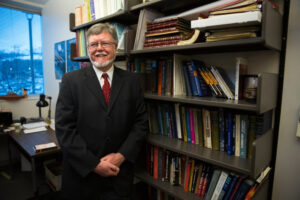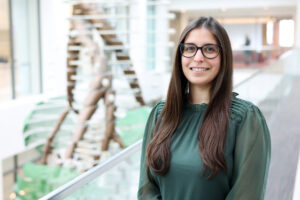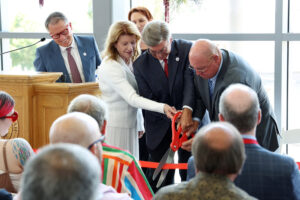Math's Kurt Vinhage, 2025 Sloan Fellow
February 18, 2025
The Alfred P. Sloan Foundation today announced the winners of the 2025 Sloan Research Fellows which includes Kurt Vinhage, assistant professor in the Department of Mathematics at the University of Utah.
Awarded this year to 126 of the most innovative young scientists across the U.S. and Canada, the Sloan Research Fellowships are one of the most competitive and prestigious awards available to early-career scholars. They are also often seen as a marker of the quality of an institution’s faculty and proof of an institution’s success in attracting the most promising early-career researchers to its ranks. Since the first Sloan Research Fellowships were awarded in 1955, 73 faculty from the U have received a Sloan Research Fellowship which includes Vinhage.
“I am honored and humbled to be named as a Sloan Fellow,” said Vinhage upon hearing the news, “and look forward to continuing my work toward understanding classification questions in dynamical systems. Any progress I have made is thanks to many hours of collaborative effort, and I would like to thank my co-authors and mentors, especially Anatole Katok and Ralf Spatzier, for their advice and encouragement throughout my journey. I look forward to continuing my mathematical journey with the help of this fellowship.”
Vinhage’s research in part answers questions about when two flows commute with one another. “Suppose we have a flow A and a flow B,” explained Vinhage. “One could follow flow A for an amount of time, then flow B for an amount of time, or do it in the opposite order, B then A. The flows commute when we end up at the same place.” This special situation is not common and Vinhage’s work aims to describe under what conditions such flows belong to a limited family of constructions, or when they can be more “exotic.”
“There are several seemingly innocuous conditions one can put on the flows which force them to belong to a well-described and well-studied class,” he continued. “This works fit into research programs called "higher-rank rigidity," "the Katok-Spatzier conjecture," or "the Zimmer program."
Said Jon Chaika, a colleague who nominated Vinhage for the Sloan Fellowship, "Kurt shows how some natural assumptions on a system automatically imply it arises from a single family of beautiful constructions. Beyond this, he showed that if one weakens these restrictions there are more examples. Kurt was granted this award on the merits of his outstanding research, but in the time he has been at the U he has made an impact on the department, sharing his enthusiasm for mathematics with undergraduates and graduate students.” Chaika detailed some of Vinhage’s activities in this area, including a summer program Vinhage runs to introduce students to advanced mathematics immediately after calculus, a once-a-semester mini workshop with colleagues at nearby Brigham Young University and Utah Valley University, and multiple successful student seminars, one of which led to a paper. “He is a fantastic colleague, and I am very happy that he has won this much-deserved award."
Vinhage earned his Ph.D. from Pennsylvania State University in 2010 followed by postdoctoral studies at the University of Chicago and Pennsylvania State before arriving at the U in 2021.
“We are thrilled that Kurt Vinhage has received the prestigious Sloan Fellowship,” said Tommaso de Fernex, chair of the Department of Mathematics at the U. “This award recognizes research accomplishments of the highest-caliber by early-career scientists. Kurt’s contributions to Ergodic Theory exemplify the excellence of his scholarship and his potential as a future leader in the field. His dedication to advancing mathematical research, along with his mentorship and collaboration within our department, made him an outstanding nominee. This well-deserved recognition highlights his impact, and we look forward to the continued growth of his work.”
by David Pace




